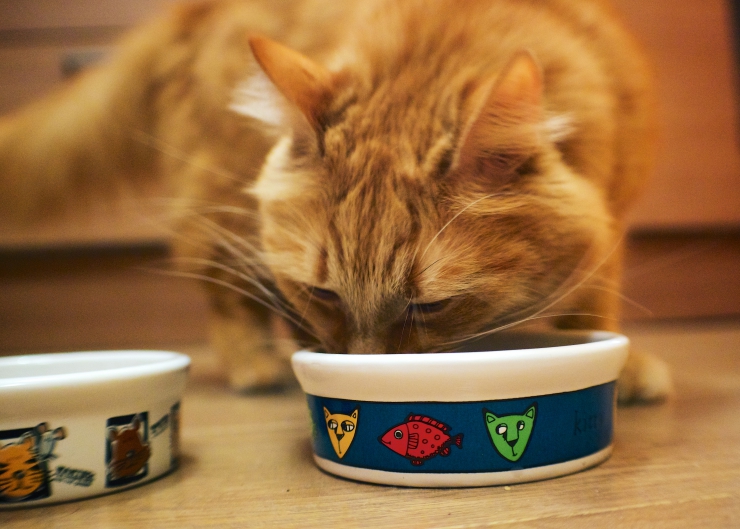No two cats are alike, or will have exactly the same eating habits so before you determine whether your cat’s eating habits are consistent with an eating disorder, you first need to know what’s normal for your cat. If you free feed your cat (e.g. leave your cat’s food bowl out all the time) it can be difficult to monitor how much your cat is eating which is why we recommend regular scheduled feeding times.
Eating disorders in cats can be a result of a medical or behavioural issue, or a nutritional deficiency. Cat eating disorders are often attributed to a cat’s history, to an underlying medical condition (such as hyperthyroidism, diabetes or gastrointestinal problems) or to factors such as stress, anxiety, depression or boredom.
The three common eating disorders in cats are over eating, not eating enough and eating non-food items. In this article, we’ll discuss over eating and not eating enough.
Over Eating
Charlie is a classic over eater. As a kitten he ate every meal as if it was going to be his last and was constantly wanting food. We believe this was a result of his early kittenhood – having to fight for food to survive and not knowing where his next meal was coming from.
We slowed his eating down by hand feeding him, spacing small amounts of food out on a large plate, and by using puzzle feeders. We also separated him from the other cats during meal times to avoid the inevitable stealing of food from their plates.
Of all three siblings, he was also the sickest as a kitten contracting calicivirus, coronavirus, giardia, cat flu and ringworm in his first year of life. He has since been diagnosed with IBD (Inflammatory Bowel Disease), which we thankfully have under control after many months of trial and error, and finally transitioning him to raw food, and introducing probiotics to his diet.
To help Charlie control his eating and manage his IBD, we do a number of things:
- strictly monitor his food intake (two meals a day and no snacks)
- supervise meal times or put him in another room
- feed the other cats treats in absolute secrecy
- distract him from food with playtime, by brushing him or by taking him for a walk in the garden
- remove temptation e.g. we don’t leave dirty dishes with food scraps on the kitchen bench.

Not Eating Enough
Angel Rose (1990 -2007) was a fussy eater, with a small appetite. Adopted from a home with a dog that terrorised cats, (the dog was later euthanised for killing a neighbours cat) Rose had a nervous disposition and spent the first few years of her life hiding under a bed. She was terrified of loud noises and visitors, and only comfortable with a few family members. She had a black fluffy coat (part Persian) but was light in weight and you could feel the bones of her ribcage when you petted her.
Getting her to eat some days was near impossible and stressful for us human caregivers. On many occasions, I’d open three different cans of cat food to try and tempt her to eat something or I’d buy her fresh snapper from the fish market.
If you have a cat who turns their nose up at the food you put down, there are a number of things to consider including the food freshness, smell and taste, bowl type and location, frequency of meals, temperature of the food, whether they are eating anywhere else (e.g at a well meaning neighbour’s house) and any underlying medical conditions or illnesses including stress.

Health Risks for Cats with Eating Disorders
Eating disorders in cats need to be taken seriously to give our cats the best possible chance of a long and quality life.
If your cat is obese, he is at risk of diabetes, heart problems, arthritis and a range of other health issues including general surgical and anaesthesia risk. Fatty liver disease can be potentially fatal for cats that lose weight too quickly or for cats that stop eating altogether.
Cats who eat non-food items are likely to end up with dangerous intestinal blockages that can be fatal. Always supervise your cat during playtime and watch what they get into around the house.


